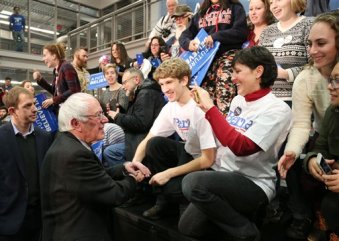By John Christen

Presidential candidates use social media to their personal and unique advantages becoming more like information. Mary Schwalm/AP
Presidential candidates are using social media more than ever before as a platform to convey messages, communicate with voters and discredit the claims of their competitors.
Donald Trump’s twitter rants often appear in the feeds of almost four million users due to retweets and his massive following. Not surprisingly, Trump tweets the most and has the most Twitter followers out of all Republican and Democratic candidates.
He also receives the most attention on Facebook, with over five million likes on his campaign page. One could argue that his celebrity status propelled his social media presence to its current height, but his internet presence has been an advantage to consider regardless.
Donald Trump (@realDonaldTrump) is not the only candidate to heavily utilize social media as a way to reach voters. Bernie Sanders and his team often attach the hashtag #feeltheBern in many Twitter posts on his account (@SenSanders). Despite his age, Bernie ranks fourth in followers and fifth in tweets sent out.
Hillary Clinton, along with Sanders and nine other presidential hopefuls, use Snapchat to reach the millennial demographic specifically, a demographic whose vote was indispensable for President Barack Obama in the 2012 presidential election.
According to a survey, nearly two-thirds of millennial Snapchat users likely to vote follow the 2016 campaign closely, illustrating one example of the importance of social media in the upcoming election. Communication platforms like Snapchat provide an opportunity for possible voters to see behind-the-scenes content of each candidate’s campaign.
This consequently drives candidates to show more of their “true selves” when they publish content online, a phenomenon that has become more important as the internet’s popularity and universality has grown.
This heavy utilization of social media platforms makes candidates seem more accessible to possible voters. It also adds an element of humanity to an otherwise separate group of political and social elites. Young people tend to focus more on online sources of news and information, which makes each candidate’s active presence online paramount.
For instance, Donald Trump’s unapologetic Twitter personality, although consistently popular, can be interpreted as both confident and over-aggressive. His tactic to maintain political popularity is simple: display the positive feedback he has received from supporters and observers, quote poll numbers that show he is dominating, and quiet dissenters via steps one and two. Unsurprisingly, this strategy has been extremely effective.
Trump also uses Twitter to take jabs at other candidates, such as his Feb. 6 strike against Jeb Bush. “Wow, Jeb Bush, whose campaign is a total disaster, had to bring in mommy to take a slap at me. Not nice!” Bush’s mother, former first lady Barbara Bush, said she was “sick” of Donald Trump when asked to share her thoughts regarding the billionaire while campaigning with her son in New Hampshire. In this instance, Twitter provided Trump with an instant mode of rebuttal, a clear demonstration of his perpetual online presence.
Clinton’s campaign Twitter account (@HillaryClinton) focuses primarily on keeping potential voters aware of her political comings-and-goings and reinforcing her position of key issues. Her online campaign tends to give users clear examples of Clinton’s dedication to working Americans and others without a voice. The page includes several photographs of Hillary going door-to-door in New Hampshire before the primary. The Democratic frontrunner’s Twitter strives to convince voters that relatability and humanity are at the center of her campaign and policy — not to mention that she is not intimidated by Donald Trump.
The social media political sphere also provides an excellent atmosphere for 2016 presidential campaigners to debate certain issues with their adversaries. Often candidates butt heads in “Twitter fights” about certain aspects of each other’s campaigns, policies and sometimes personal lives.
For instance, Jeb Bush’s comments about the funding of Planned Parenthood in early August stating that he is “not sure we need half-a-billion dollars for women’s health issues” prompted Clinton to quickly retort: “@JebBush You are absolutely, unequivocally wrong.” The ability to rapidly and succinctly deliver messages to the online public makes it easy for candidates to be certain that their sentiments about relevant issues are not misunderstood by possible voters.
The online social environment of sites like Twitter, Snapchat and Facebook are excellent forums for presidential hopefuls to communicate with potential voters on a more personal and accessible level. Social media is steadily becoming one of the most prominent ways in which people attain information, and that fact is changing the way citizens make their final vote.
